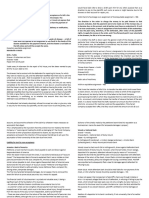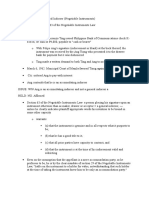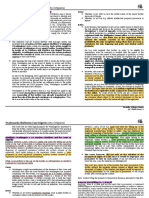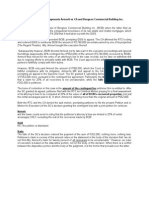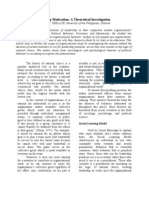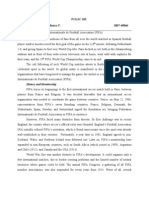Goodman Vs Gaul
Goodman Vs Gaul
Uploaded by
Bianca DeslateCopyright:
Available Formats
Goodman Vs Gaul
Goodman Vs Gaul
Uploaded by
Bianca DeslateOriginal Description:
Original Title
Copyright
Available Formats
Share this document
Did you find this document useful?
Is this content inappropriate?
Copyright:
Available Formats
Goodman Vs Gaul
Goodman Vs Gaul
Uploaded by
Bianca DeslateCopyright:
Available Formats
Goodman vs.
Gaul
Doctrine: A party for whose accommodation a note is given cannot enforce it
against the accommodator.
Facts:
Gaul is the indorser of a promissory note. Goodman is the payee of the note.
Bean is the maker. Goodman seeks to recover the amount of the promissory
note from Gaul.
Bean handed the note to Goodman. Goodman asked Gaul to indorse it. Gaul
indorsed it without any qualification.
It is contended that Gaul indorsed for the accommodation of Goodman, and is
liable to holders in due course subsequent to the payee.
Issue:
WON Gaul was an accommodation party (YES, an accommodation party for
Goodman. Therefore Goodman cannot enforce the note against him as
accommodator.)
Held:
It does not appear that maker (Bean) solicited Gauls indorsement, or had
authorized the payee (Goodman) to obtain it, or that it was understood
between the maker and the payee that the note was not to become a
completed instrument until the Gauls indorsement was obtained.
The signing and delivery of the note by the maker to the payee made the
payee (Goodman) the holder who could pass title.A negotiable instrument
payable to a named payee is negotiated when the physical possession of it is
handed for value to the person named as payee.
Gaul signed for the accommodation of the payee (Goodman), and the
party for whose accommodation a note is given cannot enforce it
against the accommodator. It is a mere gratuity.
The fact that the indorsement was made after the note had been negotiated
does not aid the Goodman, who as between himself and the defendant (Gaul)
is not a subsequent holder in due course.
Gauls indorsement cannot be considered as a written guaranty absent
express stipulations and circumstances showing that he actually undertook to
guarantee the payment of the note. A person placing his signature upon an
instrument otherwise than as maker, drawer, or acceptor is deemed to be an
indorser, unless he clearly indicates by appropriate words his intention to be
bound in some other capacity.
You might also like
- Dubai Law No.1 of 1971 Contracts LawDocument27 pagesDubai Law No.1 of 1971 Contracts Law徐金旭No ratings yet
- Contract II - Principles & AuthorityDocument19 pagesContract II - Principles & Authorityhenry aryee-anum100% (2)
- Adolph Ramish IncDocument3 pagesAdolph Ramish IncClarisseOsteriaNo ratings yet
- Caption: Parts of A Pleading (Rule 7)Document21 pagesCaption: Parts of A Pleading (Rule 7)Don YcayNo ratings yet
- Nego Chapter IV NotesDocument41 pagesNego Chapter IV Notesmelaniem_1No ratings yet
- Cathay Pacific TRANSPODocument6 pagesCathay Pacific TRANSPOChristine Ann ContiNo ratings yet
- Philippine National Bank v. Court of Appeals, G.R. No. 57757 FactsDocument70 pagesPhilippine National Bank v. Court of Appeals, G.R. No. 57757 FactsJessie James YapaoNo ratings yet
- Cornejo V CalupitanDocument2 pagesCornejo V CalupitanapbueraNo ratings yet
- En Banc Commissioner of Internal Revenue v. Northern Tobacco Redrying Co., Inc.Document11 pagesEn Banc Commissioner of Internal Revenue v. Northern Tobacco Redrying Co., Inc.Vince Lupango (imistervince)No ratings yet
- Nego Case Digest (CHECKS)Document8 pagesNego Case Digest (CHECKS)jackNo ratings yet
- Evidence Midterm ReviewerDocument24 pagesEvidence Midterm Reviewercmv mendozaNo ratings yet
- Traders Royal Bank vs. CA, 269 SCRA 16, March 3, 1997Document9 pagesTraders Royal Bank vs. CA, 269 SCRA 16, March 3, 1997XuagramellebasiNo ratings yet
- R.A. 876Document6 pagesR.A. 876HaruNo ratings yet
- Nego NotesDocument19 pagesNego NotesEricha Joy GonadanNo ratings yet
- Patriciopd - Nil Atty AmpilDocument7 pagesPatriciopd - Nil Atty AmpilPatricia Jazmin PatricioNo ratings yet
- (Digest) Tan Leonco v. Go InquiDocument1 page(Digest) Tan Leonco v. Go InquiJechel TBNo ratings yet
- Melva Theresa Alviar Gonzales, Petitioner, vs. Rizal Commercial Banking Corporation, RespondentDocument2 pagesMelva Theresa Alviar Gonzales, Petitioner, vs. Rizal Commercial Banking Corporation, RespondentCharlotteNo ratings yet
- Week 3 DigestsDocument7 pagesWeek 3 DigestsLui SebastianNo ratings yet
- Case Digest No. 14 Lee Vs CADocument2 pagesCase Digest No. 14 Lee Vs CASuzanne Pagaduan CruzNo ratings yet
- PNB V CA 256 SCRA 491Document2 pagesPNB V CA 256 SCRA 491Angeline RodriguezNo ratings yet
- PAL Vs CABDocument3 pagesPAL Vs CABChelle BelenzoNo ratings yet
- GRAND FARMS Vs CADocument2 pagesGRAND FARMS Vs CAJoel MilanNo ratings yet
- 001 - Rivera v. ChuaDocument4 pages001 - Rivera v. Chuaalexis_beaNo ratings yet
- G.R. No. L-18751, L-18915 - Philippine National Bank v. PicornellDocument9 pagesG.R. No. L-18751, L-18915 - Philippine National Bank v. PicornellJaana AlbanoNo ratings yet
- RCJ Bus Lines, Inc. v. Standard Insurance Company, Inc.Document4 pagesRCJ Bus Lines, Inc. v. Standard Insurance Company, Inc.Ruby SantillanaNo ratings yet
- ACCEPTANCE Nego 11.11.223Document10 pagesACCEPTANCE Nego 11.11.223Rebecca TatadNo ratings yet
- PNB Vs Manila OilDocument1 pagePNB Vs Manila OiljeninaaningNo ratings yet
- 25.phil Bus Rabbit VS Phil American ForwardersDocument2 pages25.phil Bus Rabbit VS Phil American ForwardersKar EnNo ratings yet
- Litwin v. AllenDocument3 pagesLitwin v. AllenAnonymous 5MiN6I78I0No ratings yet
- 16 BPI V RoyecaDocument3 pages16 BPI V RoyecarNo ratings yet
- PNB V PicornellDocument1 pagePNB V PicornellEinstein NewtonNo ratings yet
- Negotiable Instruments Law Case DigestDocument12 pagesNegotiable Instruments Law Case DigestSSNo ratings yet
- Ang Tiong V TingDocument4 pagesAng Tiong V TingMp CasNo ratings yet
- Final Exams CreditDocument2 pagesFinal Exams CreditEmilie DeanNo ratings yet
- Blaw 2 - Unit 7 - Lesson 1-4 - Acceptance For Honor, Payment For Honor, Bills in Set, Promissory Notes and ChecksDocument12 pagesBlaw 2 - Unit 7 - Lesson 1-4 - Acceptance For Honor, Payment For Honor, Bills in Set, Promissory Notes and Checksboldtespayb100% (1)
- Corazon Nevada Vs Atty Rodolfo Casuga Case DigestDocument1 pageCorazon Nevada Vs Atty Rodolfo Casuga Case DigestDhin CaragNo ratings yet
- HSBC Vs People's Bank and TrustDocument2 pagesHSBC Vs People's Bank and TrustboomonyouNo ratings yet
- West Rutland Trust Co. v. Houston DIGESTDocument2 pagesWest Rutland Trust Co. v. Houston DIGESTkathrynmaydevezaNo ratings yet
- Chapter 11 TransportationDocument15 pagesChapter 11 TransportationThích Chơi DạiNo ratings yet
- Acuña V VelosoDocument2 pagesAcuña V VelosocharmdelmoNo ratings yet
- Z. Trademark-Digest-Complete PDFDocument124 pagesZ. Trademark-Digest-Complete PDFTinn ApNo ratings yet
- Northern Motors v. SapinosoDocument3 pagesNorthern Motors v. SapinosoNorberto Sarigumba IIINo ratings yet
- Syllabus For LM21 Business Law 2Document18 pagesSyllabus For LM21 Business Law 2Justine Ashley SavetNo ratings yet
- Far East Bank and Trust Company vs. Court of Appeals, 241 SCRA 671 (1995)Document11 pagesFar East Bank and Trust Company vs. Court of Appeals, 241 SCRA 671 (1995)Katch Roraldo100% (1)
- Bar Qs NegoDocument3 pagesBar Qs NegoAra Princess OlamitNo ratings yet
- GR 13695, 18 October 1921 Standard Oil Co. of New York vs. Lopez CasteloDocument6 pagesGR 13695, 18 October 1921 Standard Oil Co. of New York vs. Lopez Castelobruncorubjr94No ratings yet
- DONE Hongkong Bank Independent Labor Union (HBILU) vs. Hongkong and Shanghai Banking Corporation Limited G.R. No. 218390, February 28, 2018Document2 pagesDONE Hongkong Bank Independent Labor Union (HBILU) vs. Hongkong and Shanghai Banking Corporation Limited G.R. No. 218390, February 28, 2018Kathlene JaoNo ratings yet
- 7 Lawless V TempleDocument1 page7 Lawless V TemplerNo ratings yet
- Nego ReviewerDocument86 pagesNego ReviewerNia JulianNo ratings yet
- PROPERTY Buayan V QuintillanDocument19 pagesPROPERTY Buayan V QuintillanPj DegolladoNo ratings yet
- 12) Mesina v. IACDocument1 page12) Mesina v. IACJenell CruzNo ratings yet
- Ramon D. Villanueva Jr. Jd-2BDocument6 pagesRamon D. Villanueva Jr. Jd-2BJean Jamailah TomugdanNo ratings yet
- Heirs of Pedro Escanlar vs. Court of AppealsDocument19 pagesHeirs of Pedro Escanlar vs. Court of AppealsRheacel LojoNo ratings yet
- 196 Equitable Banking V IACDocument4 pages196 Equitable Banking V IACZoe VelascoNo ratings yet
- Nego Chap2 MelaiDocument4 pagesNego Chap2 Melaimelaniem_1No ratings yet
- Perez V MadronaDocument8 pagesPerez V MadronaaiceljoyNo ratings yet
- Landbank of The Phil Vs Emmanuel OnateDocument8 pagesLandbank of The Phil Vs Emmanuel OnateJMF1234No ratings yet
- Blaw Report - Negotiable InstrumentDocument12 pagesBlaw Report - Negotiable Instrumentcjmarie.cadenasNo ratings yet
- Clark vs. Sellner, G.R. 16477, 22 Nov 1991Document1 pageClark vs. Sellner, G.R. 16477, 22 Nov 1991Lenie SanchezNo ratings yet
- Finals - Credit TransactionDocument28 pagesFinals - Credit TransactionGillian CapiliNo ratings yet
- RR No. 026-24Document38 pagesRR No. 026-24Bianca DeslateNo ratings yet
- Digests - Better VersionDocument24 pagesDigests - Better VersionBianca Deslate100% (1)
- Passive Income Tax Base Tax RateDocument2 pagesPassive Income Tax Base Tax RateBianca DeslateNo ratings yet
- 035 - Anglo Norwegian Fisheries CaseDocument8 pages035 - Anglo Norwegian Fisheries CaseBianca DeslateNo ratings yet
- Agustin Vs CADocument2 pagesAgustin Vs CABianca DeslateNo ratings yet
- Office of The Ombudsman Vs ReyesDocument2 pagesOffice of The Ombudsman Vs ReyesBianca Deslate100% (4)
- Agency: Nielson and Company, Inc. Vs Lepanto Consolidated Mining CompanyDocument6 pagesAgency: Nielson and Company, Inc. Vs Lepanto Consolidated Mining CompanyBianca DeslateNo ratings yet
- CH 3 NotesDocument7 pagesCH 3 NotesBianca DeslateNo ratings yet
- 4 Cheesman Vs IacDocument3 pages4 Cheesman Vs IacMichelle SilvaNo ratings yet
- 1, Law Firm of Raymundo Armovit Vs CADocument1 page1, Law Firm of Raymundo Armovit Vs CABianca DeslateNo ratings yet
- Insurance I. Definition: Aboitiz Shipping vs. New India Assurance (2006)Document3 pagesInsurance I. Definition: Aboitiz Shipping vs. New India Assurance (2006)Bianca DeslateNo ratings yet
- Unmasking Leadership Motivation Final PaperDocument5 pagesUnmasking Leadership Motivation Final PaperBianca DeslateNo ratings yet
- FIFA PaperDocument6 pagesFIFA PaperBianca DeslateNo ratings yet

























